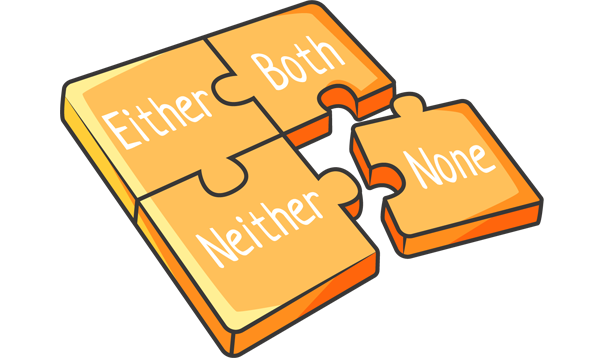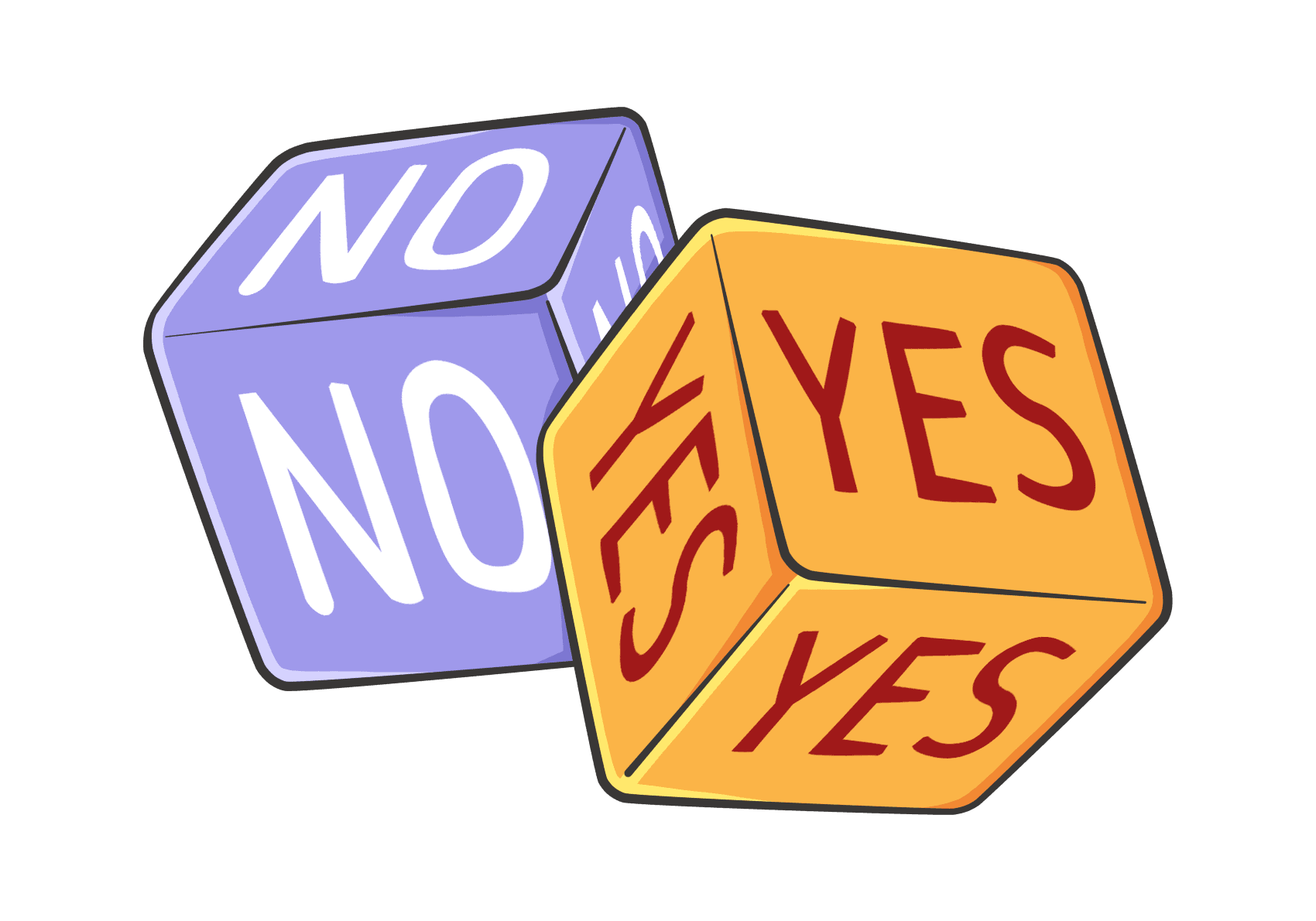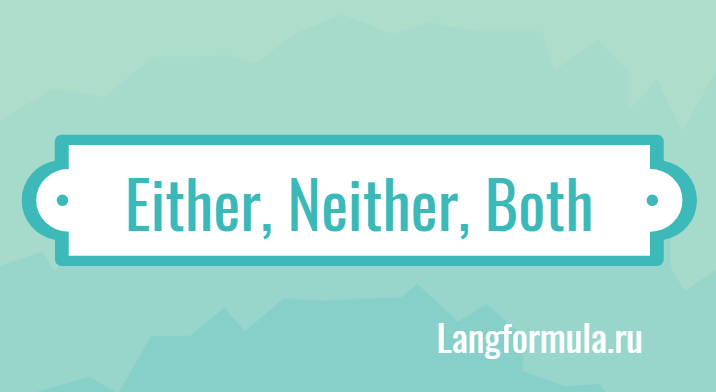В этой статье мы подробно рассказали об основных правилах употребления either, neither, none и both, а также привели примеры употребления этих слов в предложениях.
Слова either, neither, none и both часто вызывают трудности у изучающих английский язык, так как каждое из них обладает своими особенностями употребления, которые мы рассмотрим в этой статье.
Either и neither
Слова either и neither употребляются, когда речь идет о двух объектах. Несмотря на то что вне контекста either означает «один из (двух)», а neither — «ни один из (двух)», на русский язык их редко переводят дословно.
— Would you like tea or coffee?
— Either.
— Neither. I prefer juice.
— Хотите чаю или кофе?
— Что угодно.
— Ни то, ни другое. Я предпочитаю сок.
Рассмотрим особенности согласования either и neither с существительными, местоимениями и глаголами:
- Согласно правилам грамматики either и neither употребляется перед исчисляемыми существительными в единственном числе.
There will be two cakes offered for the wedding. You can choose either cake. — Для свадьбы будут предложены два торта. Вы можете выбрать любой торт.
Neither book was fascinating. — Ни одна из книг не была захватывающей. - Используем either of / neither of перед личными местоимениями.
She can invite either of them. — Она может пригласить любого из них.
Neither of us has been married. — Никто из нас не был женат. - После either of и neither of используется глагол в единственном числе.
Neither of my colleagues was around. — Никого из моих коллег поблизости не было.
Either of your plans is dangerous. — Любой из твоих планов опасен.Однако в неформальном разговоре можно использовать глагол во множественном числе.
Neither of my dogs like playing with toys. — Ни одна из моих собак не любит играть с игрушками.
I don’t think either of them are at home. — Я не думаю, что кто-то из них дома. - Either и neither часто употребляются в роли парных союзов either… or (или… или) и neither… nor (ни… ни).
You can go there either tomorrow or the day after tomorrow. — Вы можете пойти туда или завтра, или послезавтра.
Unfortunately I’ve got neither time nor desire to learn another foreign language. — К сожалению, у меня нет ни времени, ни желания изучать еще один иностранный язык.
Если перед существительным стоит артикль или слово-определитель (например, притяжательное местоимение your, his, her, their или др.), то после either и neither добавляем предлог of — either of / neither of. В этом случае существительное будет во множественном числе.
Neither of the films is interesting. I was bored to death when I was watching them. — Ни один из фильмов не интересен. Мне было до смерти скучно, когда я смотрел их.
Neither of your books will be accepted. — Ни одну из ваших книг не примут.
Выражаем согласие с помощью either и neither
Если во время беседы на английском вы хотите согласиться с отрицательным высказыванием собеседника, вы можете использовать either или neither. Рассмотрим несколько вариантов:
- Соглашаемся с помощью neither.
Чтобы согласиться с отрицательным высказыванием, в английском языке необходимо сначала поставить neither, затем вспомогательный глагол в необходимой форме (do, have, be), а потом указать, кто именно согласен (подлежащее).
— I don’t like horror films.
— Neither do I.
— Я не люблю фильмы ужасов.
— Я тоже.— My brother doesn’t like comedies.
— Neither does my sister.
— Мой брат не любит комедии.
— Моя сестра тоже. - Соглашаемся с помощью either.
Если вы хотите использовать either вместо neither, тогда функцию отрицания возьмет на себя вспомогательный глагол (будет стоять с отрицательной частичкой not).
— I don’t like dancing.
— I don’t like it either. My brother doesn’t like it either.
— Я не люблю танцевать.
— Я тоже не люблю. Мой брат тоже не любит. - Соглашаемся с помощью either или neither при наличии модальных глаголов.
Если в предложении используется модальный глагол, то он выполняет функцию вспомогательного.
— I can’t help Alex with his English essay.
— Neither can I.
— Я не могу помочь Алексу написать сочинение по английскому.
— Я тоже не могу.— I can’t understand this rule.
— I can’t understand it either.
— Я не понимаю это правило.
— Я тоже не понимаю.
None
None — это отрицательное местоимение, которое означает «ни один» (not one), «никакой» (not any). Мы его используем, чтобы заменять исчисляемые и неисчисляемые существительные в предложениях.
— What information did you have?
— None.
— У тебя была какая-то информация?
— Никакой.
My father had two sisters. My mother had none. — У моего отца было две сестры. У моей матери — ни одной.
Особенности употребления none:
- Если none заменяет в предложении подлежащее, форма глагола будет зависеть от числа исходного существительного: если существительное было в единственном числе, то и глагол, который стоит после него, тоже будет в единственном числе; если существительное было во множественном числе, то и глагол будет во множественном числе.
— What excuse did he give?
— None was good enough to believe him.
— А какое оправдание он дал?
— Ни одно оправдание не было достаточно хорошим, чтобы поверить ему.— Do you have any thoughts on the subject?
— No. None have crossed my mind.
— У вас есть какие-нибудь соображения на этот счет?
— Нет, мне ничего не пришло в голову. - Используем none of перед существительными с the, словом-определителем (this, that, my, your) и личными местоимениями.
None of these books is interesting. — Ни одна из этих книг неинтересна.
None of them came to her party. — Никто из них не пришел на вечеринку.Следует помнить о разнице между none of и neither of: none of используются с местоимениями и исчисляемыми существительными множественного числа, когда речь идет о трех и более объектах, а neither of употребляется, когда говорим о двух объектах.
Neither of my parents can dance well. — Никто из моих родителей не умеет хорошо танцевать. (родителей двое)
None of the children in the class passed the final exam. — Никто из детей в классе не сдал выпускной экзамен. (детей в классе много) - После конструкции none of ставится глагол в единственном числе, даже если объект во множественном. Использование глагола во множественном числе после none of считается неформальным.
None of the information is correct. — Ни одно из этих сведений не является верным.
None of the products have been tested on animals. (informal) — Ни один из продуктов не тестировался на животных.
Both
В английском языке слово both используется, когда необходимо объединить два предмета или двух людей. На русский язык переводится как «оба», «обе».
Martha can speak both languages. — Марта говорит на обоих языках.
Давайте рассмотрим особенности употребления both:
- Слово both используется, если перед существительным нет слова-определителя.
Both women are slim. — Обе женщины стройны.
Если перед существительным есть слово-определитель (the, my, these), можно использовать both или конструкцию both of.
Both of my sisters are doctors. = Both my sisters are doctors. — Обе мои сестры работают врачами.
- Перед личными местоимениями (us, you, them) употребляется конструкция both of.
— Where are the two books which I gave you last week?
— I’m sorry, but I’ve lost both of your books.
— А где те две книги, которые я дал тебе на прошлой неделе?
— Мне очень жаль, но я потерял обе твои книги. - Следует отметить, что слово both не используется в отрицательных предложениях, вместо него употребляется neither.
Neither of them was/were going to the party. — Никто из них не собирался на вечеринку.
- Слово both может употребляться в роли парного союза both… and (и… и; как…, так и; и тот, и другой).
Martin speaks well both English and Russian. — Мартин хорошо говорит как на английском, так и на русском.
She is both attractive and intelligent. — Она и привлекательна, и умна.
Хотите узнать все нюансы сложных грамматических конструкций английского языка? Тогда записывайтесь на курс «Практическая грамматика».
Чем чаще вы будете практиковаться в употреблении both, either, neither и none, тем быстрее вы запомните правила их использования. Чтобы закрепить эту тему, предлагаем вам пройти небольшой тест.
© 2023 englex.ru, копирование материалов возможно только при указании прямой активной ссылки на первоисточник.
Despite being just a single letter apart from each other, the two words either vs. neither have completely opposite meanings. This underscores just how important it is to use the correct word, since failing to do so could drastically change the meaning of a sentence.
What is the Difference Between Either and Neither?
In this post, I want to go over the uses of these two words. I will go over their functions, their definitions, and their pronunciations, as well as the popular phrases that use each word.
After reading this post, you shouldn’t ever confuse neither vs. either again.
When to Use Either

- Either one of the candidates would make a fine president. (Pronoun)
- This is a list of people who gave either money or time during the campaign. (Conjunction)
- You can take either car to the movie tonight. (Adjective)
- If you aren’t going to the show tonight, I won’t either.* (Adverb)
A distinctive feature that separates either from neither is that either is positive. It does not create a negation of both options.
In the examples above, either is used to indicate one or the other. It is not meant to eliminate all possibilities or options presented. That said, constructions similar to the fourth example above are best avoided or replaced with the word neither.
- If you aren’t going to the show tonight, I won’t either.
– is better stated –
- If you aren’t going to the show tonight, neither will I.
When to Use Neither

- I’m not sure. Neither shirt fits me very well. (Adjective)
- Neither of the speakers has arrived yet. (Pronoun)
- After the fight, he neither called nor wrote. (Conjunction)
- If you don’t want to go to the concert, neither do I. (Adverb)
As mentioned above, neither creates a total negation, which cannot be said about the word either.
How to Pronounce Either and Neither
How to pronounce either: In American English, ee–ther is the preferred and more common pronunciation. The pronunciation i–ther is not incorrect, just sometimes considered pretentious in American English. The i–ther pronunciation is dominant in British English.
How to pronounce neither: In American English, nee–ther is the traditionally preferred pronunciation, with ni–ther being considered mildly pretentious.
In British English, however, ni–ther is considered normal.
Me Either or Me Neither?
There are quite a few different phrases/idioms that use both either and neither.
- Either Way: Whichever of the two given alternatives be the case.
I’m not sure whether his name is Greg or Joe, but, either way, address him as sir.
- Me Neither: Nor do I.
– I don’t want to leave the city tonight.
– Yeah—me neither.
Number of Elements When Using Either or Neither

- Either this or that.
- Neither this nor that.
It is possible to find examples in print or on the web where these words are comparing many alternatives, but this should be avoided whenever possible.
- I had neither considered your offer, the location, nor the position yet.
- We can make either hotdogs, hamburgers, or BBQ. Your pick.
It’s best to omit neither or either in sentences like those above.
- I had not considered your offer, the location, or the position yet.
- We can make hotdogs, hamburgers, or BBQ. Your pick.
Is Neither/Either Singular or Plural?

- Either of the two offers was better than my current job.
- Neither of the coupons was a good one.
Singular/Plural When Using Neither… Nor Constructions
When you have sentences that take the neither… nor construction, the verb that follows should be singular when the alternatives are singular or when the second alternative is singular. For example,
- Neither the engine nor the fuel tank leaks any fluid.
- Neither the fuel lines nor the fuel tank leaks any fluid.
– but –
- Neither the fuel tank nor the fuel lines leak any fluid.
In the first example, both alternatives are singular, so a singular verb follows. Similarly, in the second example, the second alternative is singular, so a singular verb follows.
The third example has a plural second alternative, so the verb that follows the construction is plural.
Singular/Plural When Using Either … Or Constructions
Nouns that are framed by an either … or construction take a singular or plural verb, depending on which noun is closest to the verb. For example,
- Either she or they need the recipe.
- Either they or she needs the recipe.
The first sentence has the plural they closest to the verb need, so the verb is plural.
The second sentence has the singular she closest to the verb needs, so the verb is singular.
Parallelism When Using Either and Neither
When you are using either and neither, you should be sure to keep the elements of you sentences parallel syntactically. For example,
- The audience was reimbursed either with vouchers or food.
– should read –
- The audience was reimbursed with either vouchers or food.
In the first sentence, the two elements do not match each other. Consider another example,
- The donations have neither been disclosed nor accounted for.
– should read –
- The donations have been neither disclosed nor accounted for.
Remember the Difference

Neither creates a negation and starts with the letter “N.” Neither means not one of the given options.
If you can remember this trick, you’ll be all set.
Summary
Both of these words have multiple functions within a sentence, but knowing when to use either or neither is very important since they have near opposite meanings.
Either means one or the other.
Neither means not one or the other.
Contents
- 1 What is the Difference Between Either and Neither?
- 2 When to Use Either
- 3 When to Use Neither
- 4 How to Pronounce Either and Neither
- 5 Me Either or Me Neither?
- 6 Number of Elements When Using Either or Neither
- 7 Is Neither/Either Singular or Plural?
- 8 Singular/Plural When Using Neither… Nor Constructions
- 9 Singular/Plural When Using Either … Or Constructions
- 10 Parallelism When Using Either and Neither
- 11 Remember the Difference
- 12 Summary
Слова either, neither, both в английском языке могут использоваться:
- Как определители, уточняя значение существительного или местоимения,
- Как союзы в сочетании с or и and: either… or, neither… nor, both… and …
Рассмотрим сначала вариант с союзами.
Содержание:
- Союзы Either… or, Neither… nor, Both… and …
- Определители Either, Neither, Both.
- Как произносятся Either и Neither.
Союзы Either… or, Neither… nor, Both… and …
Союзы either… or, neither… nor, both… and … используются, когда речь идет о двух противопоставляемых понятиях. Разберем их на примере с предложением:
This robot can swim. – Этот робот умеет плавать.
1. Either… or — «или… или»
Союз either… or значит «или… или», «либо… либо» и подразумевает присутствие либо одного действия, либо другого, но не обоих сразу. Как и его аналог в русском языке, он ставится не между двумя словами, а одна часть перед одним словом, другая перед другим.
This robot can either swim or walk. – Это робот умеет или плавать, или ходить.
2. Neither… nor — «ни…, ни»
Союз neither… nor значит «ни…, ни…», подразумевает отрицание обоих действий.
This robot can neither swim nor walk. – Это робот не умеет ни плавать, ни ходить.
Обратите внимание: в предложении с neither… nor глагол can стоит в утвердительной форме. Союз neither… nor сам несет отрицательное значение, поэтому глагол can ставить в отрицательную форму не нужно.
3. Both… and … — «как…, так и …»
Союз both… and… значит «как…, так и …», «и… и…», подразумевает наличие обоих понятий.
This robot can both swim and walk. – Это робот умеет как плавать, так и ходить.
Эти союзы могут использоваться не только с глаголами, но и с другими частями речи.
The fence can be either wooden or metal. – Забор может быть либо деревянным, либо металлическим.
This is neither a spoon nor a fork. – Это и не ложка, и не вилка.
You can’t be both his friend and boss at the same time. – Ты не можешь быть и его другом, и боссом одновременно.
Слова either, neither, both также часто используются как определители в сочетании с существительными или местоимениями.
1. Either + существительное
Either используется в значении «каждый из двух», «и тот, и другой» с исчисляемыми существительными в единственном числе. Обратите внимание, either может употребляться как в утвердительных предложениях, так и в отрицательных.
You said, I’m either with you or against you. I don’t like either option. — Вы сказали, что я либо с вами, либо против вас. Мне не нравится ни один вариант, ни другой.
Which car of those two is better? Either car is fine as long as it works. — Какая машина из тех двух лучше? И та, и другая машина подойдет, при условии, что она работает.
Мы говорим either of, если после него идет the, these, those или притяжательное местоимение:
Either of those cars is fine. — Каждая из тех машин подойдет.
Do you know those two guys? I didn’t invite either of them. — Ты знаешь тех двоих парней? Я не приглашал ни одного из них.
Мы можем использовать either без существительного, предмет будет только подразумеваться:
— Which car do you like? — Какая машина тебе нравится?
— I don’t like either. — Мне не нравится ни та, ни другая.
2. Neither + существительное
Neither используется в значении «ни один из двух», «ни тот, ни другой» с исчисляемыми существительными в единственном числе. Neither не употребляется в отрицательных предложениях, т. к. само уже включает отрицание.
There are two banks in the town. Neither bank has video surveillance. — В городе есть два банка. Ни в одном из банков нет видеонаблюдения.
Neither parent has signed the petition. — Ни один из родителей (ни отец, ни мать) не подписал петицию.
Мы говорим neither of, если после него идет the, these, those или притяжательное местоимение:
Neither of those banks has video surveillance. — Ни в одном из тех (двух) банков нет видеонаблюдения.
Neither of his parents showed up in the school. — Ни один из его родителей не появился в школе.
3. Both + существительное
Слово both используется как определитель «оба» перед существительными во множественном числе.
Hold the steering wheel with both hands. – Держи руль обеими руками.
Both sisters are students. – Обе сестры – студентки.
Если перед существительным стоит the, these, those или притяжательное местоимение, после both может добавляться of. Могут использоваться оба варианта, как both, так и both of:
Both (of) my sisters are students. – Обе мои сестры – студентки.
Both (of) his hands were injured. – Обе его руки были травмированы.
Mix both (of) those powders together. — Смешайте оба этих порошка.
Both может использоваться без существительного, оно будет только подразумеваться:
— Which books would you like to buy? — Какую (из этих двух) книгу вы бы хотели купить?
— Both. — Обе.
Разница между Either, Neither, Both
Еще раз рассмотрим разницу между тремя определителями. Возьмем одно и то же предложение и представим его в трех вариантах с either, neither и both:
1. I like either car. — Мне нравится и эта машина, и другая.
2. I like both cars. — Мне нравятся обе машины.
3. I like neither car. — Мне не нравится ни эта машина, ни другая.
Как видите, варианты 1 и 2 похожи, однако не абсолютно идентичны по смыслу. Вариант 3 имеет противоположный смысл.
Как произносятся Either и Neither
Слова either и neither могут произноситься двумя способами, которые условно можно назвать британским и американским вариантом произношения.
Американский вариант:
- Either [ˈiðər],
- Neither [ˈniðər].
Британский вариант:
- Either [ˈaɪðə],
- Neither [ˈnaɪðə].
«Условно», потому что в США некоторые люди говорят [ˈaɪðə], а в Великобритании [ˈiðər], то есть строгой нормы нет. Также ни один из этих вариантов не считается «более правильным», чем другой. В общем, говорите, как вам удобнее или привычнее — разницы нет никакой.
Здравствуйте! Меня зовут Сергей Ним, я автор этого сайта, а также книг, курсов, видеоуроков по английскому языку.
Подпишитесь на мой Телеграм-канал, чтобы узнавать о новых видео, материалах по английскому языку.
У меня также есть канал на YouTube, где я регулярно публикую свои видео.
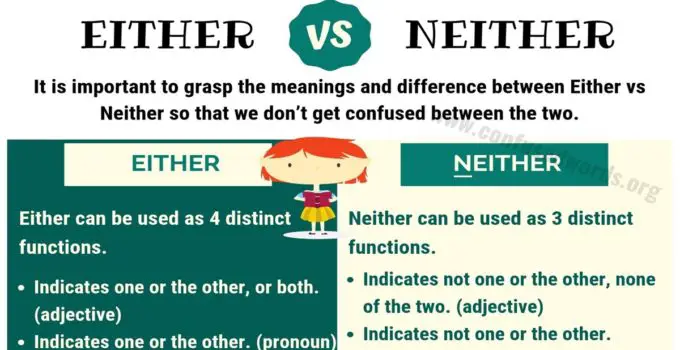 Pin
Pin
EITHER or NEITHER? It is important to grasp the meanings and difference between Either vs Neither so that we don’t get confused between the two. Both words can be used as a pronoun, conjunction, and adjective; however, the use of Either is considered positive, while the use of Neither is considered negative.
EITHER or NEITHER?
How to use Either or Neither in English?
The words neither vs either may be used as several different parts of speech. We will look at the meanings of the confused words either and neither, the difference between neither vs either and how to use them.
How to Use Either
Either can be used as a pronoun, adverb, adjective, and conjunction.
- As an adjective, it indicates one or the other, or both.
- As a pronoun, it indicates one or the other.
- As a conjunction, it is used with or to imply a choice of alternatives.
- As an adverb, it means also, following negative expressions.
Either Examples:
- You may use either hand for the purpose.
- Both buses are headed in that direction, you can get on either.
- You can either play on the computer or watch TV.
- You don’t like apples. I don’t either.
How to Use Neither
Neither can be used as conjunction, pronoun, and adjective.
- As an adjective, it indicates not one or the other, none of the two.
- As a pronoun, it indicates not one or the other.
- As a conjunction, it is used with nor to negate both parts of a statement.
- Neither is NOT used as an adverb.
Neither Examples:
- Neither twin was invited to the prom.
- Neither of the speakers has arrived yet.
- I can neither play on the computer nor watch TV.
- If you don’t want to go to the concert, neither do I.
EITHER vs NEITHER | Infographic
Either or Neither – What’s the Difference?
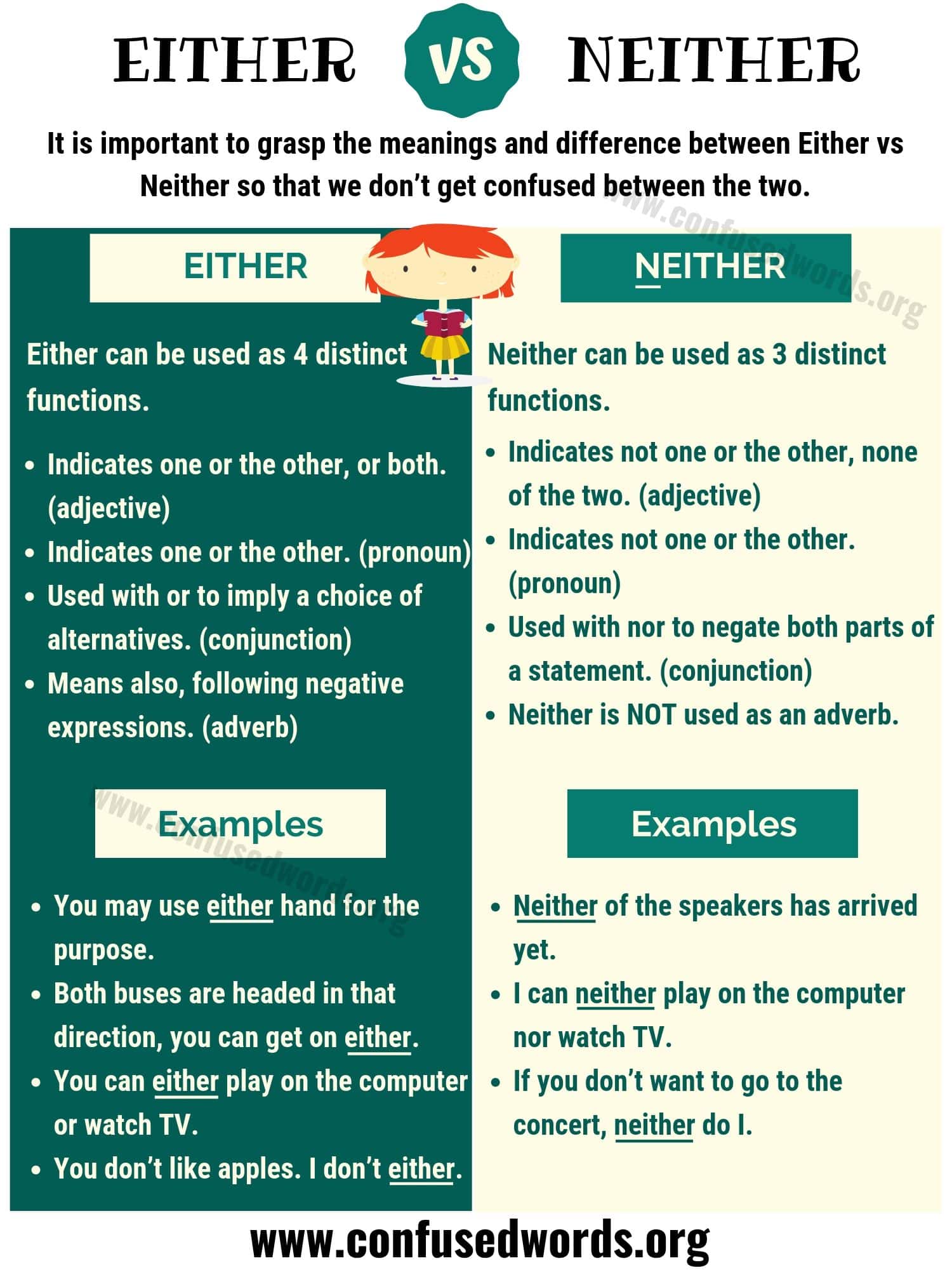
Download Article
Download Article
If you have difficulty figuring out when to use «either» and when to use «neither,» you’re not alone. Proper use of these words sometimes confuses native English speakers and it’s all the more difficult to know when to use them when you’re just learning English. To further complicate the issue, these two versatile words can be used as 4 different parts of speech: conjunction, adjective, pronoun, or adverb. It might be helpful to remember that «either» is often paired with «or» and «neither» is almost always paired with «nor.»
-
1
Link two alternative things together with «either» or «neither.» When used as a conjunction, the words «either» and «neither» pair with «or» or «nor» to link two distinct things. If you have more than two options, it would not be appropriate to use «either» or «neither.» The conjunction «either/or» means that only one of the two things you’ve listed will happen. «Neither/nor,» on the other hand, means that none of the two things listed will happen.[1]
- Either/or example: «For dessert, we can have either cake or pie.» In this example, it is not an option to have both cake and pie – you can only have one or the other.
- Neither/nor example: «I will neither cook for you nor pick something up.» In this example, you don’t know for sure what the speaker is going to do, but you do know of two things that they specifically are not going to do.
Avoid Double Negatives! If you’re using a negative verb, use «either/or» instead of «neither/nor.»
-
2
Place «either» or «neither» after the verb if the actions are similar. If the actions you’re comparing share a verb, use «either» or «neither» after the shared verb. Then place the word «or» or «nor» between the two actions.[2]
- Either/or example: «The restaurant offered either steak or fish as the main course.» In this example, you have a choice between steak and fish.
- Neither/nor example: «Vegans eat neither meat nor animal byproducts.» This example explains that vegans do not eat any meat or animal byproducts such as eggs, milk, or cheese.
Advertisement
-
3
Move «either» or «neither» to before the verb is the actions are different. «Either» and «neither» can also be used to link two things that each have their own verb. In this situation, the conjunction joins the entire verb phrase.[3]
- Either/or example: «You can either ride a bike or drive a car.» In this example, you have the choice of riding a bike or driving a car, but you can’t do both at the same time.
- Neither/no example: «Chefs neither wash dishes nor serve customers.» This example explains that while chefs work in restaurants, they are not responsible for washing dishes or serving food to diners.
-
4
Use «nor» only when you use the word «neither.» While you often see the word «or» used by itself without the word «either,» the word «nor» is only used when the word «neither» also appears in the sentence. Instead of using the word «nor» by itself, either make the verb negative and use the word «or» or add the word «neither.»[4]
- For example, suppose someone wrote: «I fear man nor beast.» This would be incorrect. To fix it, you could write either «I don’t fear man or beast» or «I fear neither man nor beast.»
-
5
Choose singular verbs for most «neither/nor» constructions. The «neither/nor» construction means that none of the linked options are available or will happen. A singular verb is usually appropriate unless the last of the linked options is a plural word.[5]
- For example, you could write «Neither a cupcake nor a cookie sounds good to me.» However, you would write «Neither Game of Thrones nor dragons interest me,» because the word «dragons» is plural.
- If both of the linked options are plural, you would also use a plural verb. However, what’s important when choosing which verb form to use is whether the last option that precedes the verb is singular or plural.
-
6
Match the verb in «either/or» constructions to the noun closest to the verb. When using «either/or,» you state that only one of the two options is available or can be chosen at a time. Make the verb you use singular or plural depending on whether the noun that precedes the verb is singular or plural.[6]
- For example, you would say «Either a burger or pizza sounds good to me.» But if you were contemplating ordering several pizzas, you would say «Either a burger or pizzas sound good to me.»
-
7
Maintain parallelism with alternatives joined by «either/or» or «neither/nor.» When using «either/or» or «neither/nor» as a conjunction, the two alternatives presented should have the same or similar constructions. The elements of each alternative thus parallel each other.[7]
- For example, instead of saying «Passengers were compensated either with food or vouchers,» you would say «Passengers were compensated with either food or vouchers.» Notice how you move the word «with» before the word «either,» so that the two things you’re comparing are the same: «food» and «vouchers.»
Advertisement
-
1
Place «either» or «neither» immediately in front of the noun it modifies. You don’t always need to combine «either» and «neither» with «or» or «nor.» If you want to present two alternatives that are essentially the same thing, use a single noun combined with «either» or «neither.»[8]
- Either example: «You can choose either kitten.» In this example, there are exactly two kittens, and you can have one of them (but not both).
- Neither example: «Neither kitten is for sale.» In this example, you are being told that there are two kittens but you can’t have them.
Tip: «Either» and «neither» are only used to modify singular or collective nouns.
-
2
Use «either» or «neither» as a determiner for the noun. When used as an adjective, «either» and «neither» are determiners that clarify the noun for your reader or listener. With «either,» you’re saying that the statement is true for only one of two alternatives. With «neither,» there are two alternatives and your statement doesn’t apply to them.[9]
- For example, if you say «Neither candidate was prepared for the debate,» you are telling your listener that there are two candidates participating in the debate, but they were not adequately prepared to discuss the questions posed to them.
- On the other hand, if you say «Either kitten can be adopted,» you are telling your listener that there are two kittens left in the litter, but only one of them is available for adoption.
-
3
Replace «either» or «neither» with alternate expressions. If you’re not certain if you’re using «either» or «neither» correctly, you can express the statement differently by making the noun negative or using a different noun phrase. If the alternative expression communicates what you intended, you’ve used the word correctly.[10]
- Instead of saying «You may adopt either kitten,» you could say «You may adopt one of the two kittens.»
- Instead of saying «You may adopt neither kitten,» you could say «You may not adopt one and you may not adopt the other of the two kittens,» or «You may not adopt either of the two kittens.»
Advertisement
-
1
Follow «either» or «neither» with the word «of» and a noun phrase. «Either» and «neither» can also be used as pronouns that stand for two specific things that can be described using the same noun. If you use «either,» you’re saying that the statement is only true for one of the two things. With «neither,» the statement isn’t true for either of the two things.[11]
- Either example: «Either of the kittens can be adopted.» In this example, you’re saying that only one of the kittens can be adopted but not both of them.
- Neither example: «Neither of the kittens is up for adoption.» In this example, you’re saying that there are exactly two kittens but they are not available to be adopted.
Tip: The noun in the noun phrase is always a plural or a collective noun because you’re referring to the group of two things.
-
2
Use a singular verb when «either» or «neither» is the subject of the sentence. When using «either» or «neither» as a pronoun, you may be tempted to use a plural verb since the noun immediately preceding the verb is plural. However, the verb should agree with «either» or «neither.» Since «either» always means one thing and «neither» means no things, a singular verb is appropriate.[12]
- Either example: «Either of the desserts comes with your meal.»
- Neither example: «Neither of the desserts is sugar-free.»
-
3
Substitute alternate expressions to check your usage. You can make the verb negative or add additional words to say the same thing without using «either» or «neither.» This can be a good way to double-check and make sure you’re using the correct word.[13]
- Instead of «You can adopt either of the kittens,» you could say «You can adopt one or the other of the kittens» or «You can adopt one of the kittens or you can adopt the other kitten.»
- Instead of «You can adopt neither of the kittens,» you could say «You cannot adopt either of the kittens,» or «You cannot adopt the one kitten and you cannot adopt the other kitten.»
Advertisement
-
1
Use «either» to mean «in addition.» As an adverb, «either» is always combined with a negative statement. It combines two statements about one thing, but instead of meaning that only one of them is true, it means that both of them are true.[14]
- For example, if you said «The apartment’s rent is affordable and it’s not small either,» you would be saying that the apartment was affordable and also not small.
-
2
Use «neither» if you want to eliminate all options presented. When used as an adverb, the word «neither» means «similarly not» or «also not.» Neither creates a negation that may indicate agreement with the other statement or completely rule out both things offered.[15]
- For example, if someone says to you «I don’t think I want to go to the concert tomorrow night,» you might reply «If you don’t go, neither will I.» You’re telling the person that you’re only interested in going to the concert if they’re going too.
-
3
Indicate a link with the previous statement made. «Either» and «neither» are frequently used as adverbs when someone says something to you and you want to express agreement with what they said or otherwise express your preference. The key difference is that «neither» eliminates all options presented.[16]
- Either example: «
- Neither example: «Would you like coffee or tea?» «Neither.»
Tip: In informal speech, you can say «me either» or «me neither» to agree with a negative statement someone has made. In this context, both phrases mean the same thing. However, «neither» is more correct since «either» means «one or the other.»
Advertisement
Ask a Question
200 characters left
Include your email address to get a message when this question is answered.
Submit
Advertisement
-
In American English, «either» and «neither» are pronounced with a long E sound in the first syllable. In British English, however, the long I sound is preferred. Both pronunciations are correct, but if you use the British pronunciation when talking to Americans, you might come across as pretentious.[17]
Thanks for submitting a tip for review!
Advertisement
References
About This Article
Thanks to all authors for creating a page that has been read 30,338 times.
Reader Success Stories
-
Mehmet Tekman
Nov 8, 2021
«Yes, I had an English exam today and although I have confidence in my English, either/neither stuff has always been…» more
Did this article help you?
Get all the best how-tos!
Sign up for wikiHow’s weekly email newsletter
Subscribe
You’re all set!

